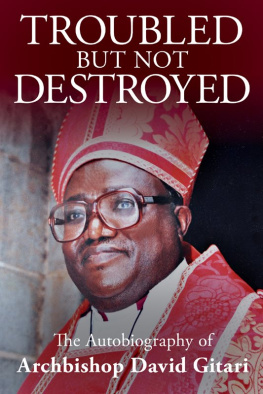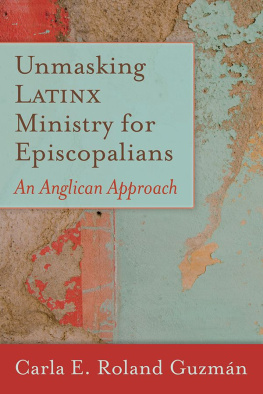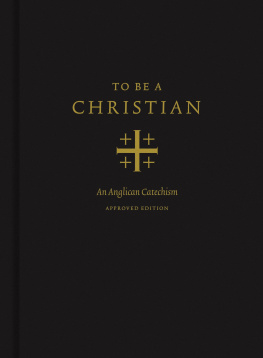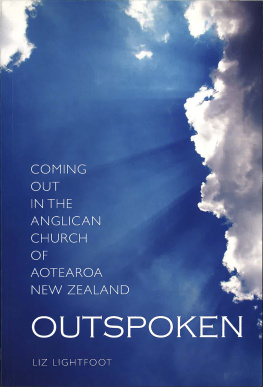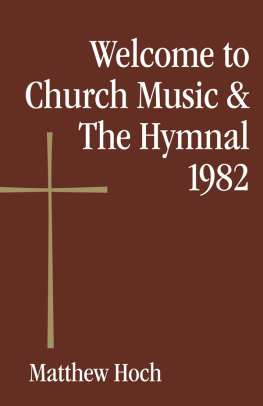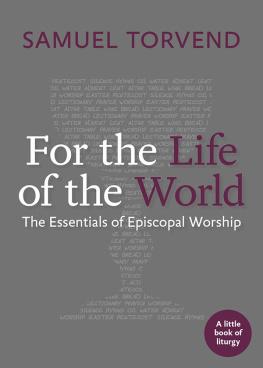

Troubled But Not Destroyed: Autobiography of Dr. David M. Gitari, Retired Archbishop of the Anglican Church of Kenya
Isaac Publishing, 6729 Curran Street, McLean VA 22101
Copyright 2014 The Archbishop David Gitari Foundation
All rights reserved. No part of this publication may be reproduced, stored in a retrieval system, or transmitted in any form or by any means, electronic, photocopy or recording without the prior written permission of the publisher, except in brief quotations in written reviews.
Financial assistance towards this publication has been received from The Drummond Trust, 3 Pitt Terrace, Stirling, and is gratefully acknowledged. Warm gratitude is also expressed to the Barnabas Fund for its very significant support for this publication.
Library of Congress Control Number: 2014950950
ISBN: 978-0-9916145-4-7
ISBN: 9780991614554
Book design by Lee Lewis Walsh, Words Plus Design
Printed in Kenya by Majestic Printers, Nairobi
Archbishop David Gitari of Kenya
global African Anglican leader
D avid Mukuba Gitari (19372013), first Bishop of the Diocese of Mount Kenya East (19751997) and Archbishop of Kenya (19972002), was one of the first post-colonial global African Christian leaders.
He came to prominence in Kenya in 1975 when he gave a series of six bible expositions on the Voice of Kenya radio. J.M. Kariuki M.P. had been found murdered in the Ngong Hills. Gitari expounded Cains murder of Abel. He was carpeted by VoK and told his sermons had been disturbing. Gitari replied that the gospel of Jesus Christ is very disturbing, especially to sinners.
Biblical exposition set the pattern for his preaching, proclaiming orthodox Christian faith to the whole of society and the powers that be.
He was elected first bishop of the new Diocese of Mount Kenya East in 1975 at the age of 38, only four years after ordination as a deacon. He drew round him gifted people from all parts of the world and inspired love and loyalty in those who worked with him. He took as a motto Jesus growth in favour with God and man (Luke 2:52) and promoted culturally appropriate evangelism, appointing camel borne evangelists for nomads in the north of his diocese, and social action through establishing Christian Community Services (CCS) and a team of barefoot health workers.
He demonstrated a new style of leadership by identifying younger gifted leaders and releasing them into ministry. He saw no incompatibility between mainstream Anglicanism and being an evangelical church leader. He moved evangelicalism on from being a movement in the Church for evangelicalism to being an expression of the churchs faith itself.
He challenged President Moi especially over his abolition of the secret ballot in 1987. In 1989 he was the object of an assassination attempt in his own home, which was widely believed to have been instigated by the state authorities.
At the 1988 Lambeth Conference, he piloted through a change in the churchs discipline for people in polygamous marriages before their baptism. In 1998, he provided leadership for Lambeth 1.10 on human sexuality, thereby consolidating Anglican orthodoxy as a global movement with significant leadership from Africans.
He served as a member of the Anglican-Roman Catholic International Commission, vice-moderator of the Commission for World Mission and Evangelism of the World Council of Churches, chairman of the Theological Commission of the World Evangelical Fellowship, the founder chairman of the African Theological Fraternity and the founder chairman of the Oxford Centre for Mission Studies and of its journal Transformation. He chaired the Conference of African Churches with the World Bank in 2000.
When installed as Archbishop in 1997, he announced the date of his retirement for 2002 aged 65 and established the Philadelphia Centre on his farm in Embu. In 1998 he was awarded an honorary doctorate by the University of Kent.
He kept a daily diary from his early years. His autobiography is an unparallelled resource for African Church history in the twentieth century.
Contents
Acknowledgements
D uring the ten years I have been writing this autobiography, a number of people spent many hours typing from my hand-written manuscripts. Peris Njeri, my daughter in-law and Nancy Njura typed most of the chapters. I am also grateful to Ruth Waceke Njiru, who typed the appendices.
Eva Macharia, who was my able secretary when I was the Archbishop of Kenya between 1997 and 2002, helped in searching for important documents in the archives of the Province during the formative stages of this autobiography.
I found it very difficult to write the chapter on the third president of Kenya, Mwai Kibaki. I am however grateful to the one time Comptroller of State House, John Matere Keriri, for reading my first draft of the chapter and for making useful suggestions and corrections. I am also very pleased that the Revd Dr John Karanja, a Professor of Church History and African studies at the Trinity Lutheran Seminary at the Ohio State University, USA, visited and stayed with me at my Philadelphia home in Kirinyaga county, during which time he read the whole manuscript and made useful suggestions to improve the book. My long-term friend since our university days at Royal College (later University of Nairobi), Archbald Githinji, also read the manuscript and reminded me of important events that he felt should have been included in the book. I also appreciate the encouragement that I was given by Eunice Njeri Sahle, a Kenyan scholar from Kirinyaga who is currently an Associate Professor at the University of North Carolina at Chapel Hill, USA.
The Anglican Bishops in Kenya and members of the Provincial Synod have constantly urged me to complete the book, which they knew that I have been writing since my retirement. They have been waiting for the publication of the autobiography and I thank them for their encouragement and patience.
I am also grateful to my son John Mwendwa, a communicator by profession, for reading the whole manuscript and editing it.
Finally I wish to express my gratitude to Chris Sugden for preparing the manuscript for publication and ensuring that it receives the widest circulation in various parts of the world.
Dedication
T his book is dedicated to my parents, Samuel Mukuba and Jessie Njuku, who taught me about Jesus Christ from my childhood and instructed me in the Christian faith. Their commitment to the church created in me an irresistible desire to offer my life to the full-time service of Christ and his Church. The book is also dedicated to my sons, Samuel, Jonathan and John, and their wives, who gave me every encouragement to write the book. I also dedicate the book to my grandchildren, who have given me much joy in my retirement.
Introduction
A good number of scholars have approached me with the intention of writing my biography and I have given them every encouragement and a good number have interviewed me. However no complete biography has so far been published even though chapters about my ministry as a bishop of the church have appeared in a number of publications. The Ven. Patrick Benson used my case study for his thesis for his master of philosophy degree. The thesis, entitled Church Confrontation with State During Kenyas Nyayo Era: Causes and Effects, was submitted to the Open University, England in November 1993. Bishop Gideon Githiga published his doctoral thesis for the Open University entitled The Church as the Bulwark against Extremism (Oxford, Regnum, 2001), which summarises the Development of Church-State Relationship in Kenya, with particular reference to the years after Independence from 1963-1992. The book refers to my prophetic ministry and is also dedicated to me.
Next page
